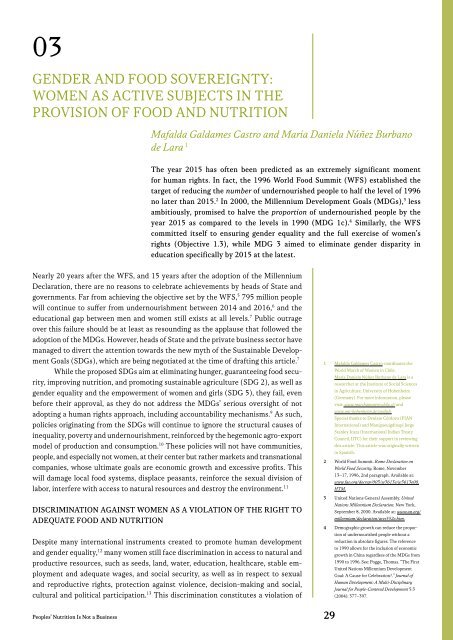RIGHT TO FOOD AND NUTRITION WATCH
1iNBHTY
1iNBHTY
Create successful ePaper yourself
Turn your PDF publications into a flip-book with our unique Google optimized e-Paper software.
03<br />
GENDER <strong>AND</strong> <strong>FOOD</strong> SOVEREIGNTY:<br />
WOMEN AS ACTIVE SUBJECTS IN THE<br />
PROVISION OF <strong>FOOD</strong> <strong>AND</strong> <strong>NUTRITION</strong><br />
Mafalda Galdames Castro and María Daniela Núñez Burbano<br />
de Lara 1<br />
The year 2015 has often been predicted as an extremely significant moment<br />
for human rights. In fact, the 1996 World Food Summit (WFS) established the<br />
target of reducing the number of undernourished people to half the level of 1996<br />
no later than 2015. 2 In 2000, the Millennium Development Goals (MDGs), 3 less<br />
ambitiously, promised to halve the proportion of undernourished people by the<br />
year 2015 as compared to the levels in 1990 (MDG 1c). 4 Similarly, the WFS<br />
committed itself to ensuring gender equality and the full exercise of women’s<br />
rights (Objective 1.3), while MDG 3 aimed to eliminate gender disparity in<br />
education specifically by 2015 at the latest.<br />
Nearly 20 years after the WFS, and 15 years after the adoption of the Millennium<br />
Declaration, there are no reasons to celebrate achievements by heads of State and<br />
governments. Far from achieving the objective set by the WFS, 5 795 million people<br />
will continue to suffer from undernourishment between 2014 and 2016, 6 and the<br />
educational gap between men and women still exists at all levels. 7 Public outrage<br />
over this failure should be at least as resounding as the applause that followed the<br />
adoption of the MDGs. However, heads of State and the private business sector have<br />
managed to divert the attention towards the new myth of the Sustainable Development<br />
Goals (SDGs), which are being negotiated at the time of drafting this article. 7<br />
While the proposed SDGs aim at eliminating hunger, guaranteeing food security,<br />
improving nutrition, and promoting sustainable agriculture (SDG 2), as well as<br />
gender equality and the empowerment of women and girls (SDG 5), they fail, even<br />
before their approval, as they do not address the MDGs’ serious oversight of not<br />
adopting a human rights approach, including accountability mechanisms. 9 As such,<br />
policies originating from the SDGs will continue to ignore the structural causes of<br />
inequality, poverty and undernourishment, reinforced by the hegemonic agro-export<br />
model of production and consumption. 10 These policies will not have communities,<br />
people, and especially not women, at their center but rather markets and transnational<br />
companies, whose ultimate goals are economic growth and excessive profits. This<br />
will damage local food systems, displace peasants, reinforce the sexual division of<br />
labor, interfere with access to natural resources and destroy the environment. 11<br />
DISCRIMINATION AGAINST WOMEN AS A VIOLATION OF THE <strong>RIGHT</strong> <strong>TO</strong><br />
ADEQUATE <strong>FOOD</strong> <strong>AND</strong> <strong>NUTRITION</strong><br />
Despite many international instruments created to promote human development<br />
and gender equality, 12 many women still face discrimination in access to natural and<br />
productive resources, such as seeds, land, water, education, healthcare, stable employment<br />
and adequate wages, and social security, as well as in respect to sexual<br />
and reproductive rights, protection against violence, decision-making and social,<br />
cultural and political participation. 13 This discrimination constitutes a violation of<br />
1 Mafalda Galdames Castro coordinates the<br />
World March of Women in Chile.<br />
María Daniela Núñez Burbano de Lara is a<br />
researcher at the Institute of Social Sciences<br />
in Agriculture, University of Hohenheim<br />
(Germany). For more information, please<br />
visit: www.marchamujereschile.cl/ and<br />
www.uni-hohenheim.de/english.<br />
Special thanks to Denisse Córdova (FIAN<br />
International) and Manigueuigdinapi Jorge<br />
Stanley Icaza (International Indian Treaty<br />
Council, IITC) for their support in reviewing<br />
this article. This article was originally written<br />
in Spanish.<br />
2 World Food Summit. Rome Declaration on<br />
World Food Security. Rome, November<br />
13–17, 1996, 2nd paragraph. Available at:<br />
www.fao.org/docrep/003/w3613e/w3613e00.<br />
HTM.<br />
3 United Nations General Assembly. United<br />
Nations Millennium Declaration. New York,<br />
September 8, 2000. Available at: www.un.org/<br />
millennium/declaration/ares552e.htm.<br />
4 Demographic growth can reduce the proportion<br />
of undernourished people without a<br />
reduction in absolute figures. The reference<br />
to 1990 allows for the inclusion of economic<br />
growth in China regardless of the MDGs from<br />
1990 to 1996. See: Pogge, Thomas. “The First<br />
United Nations Millennium Development<br />
Goal: A Cause for Celebration?.” Journal of<br />
Human Development: A Multi-Disciplinary<br />
Journal for People-Centered Development 5:3<br />
(2004): 377–397.<br />
Peoples’ Nutrition Is Not a Business 29


